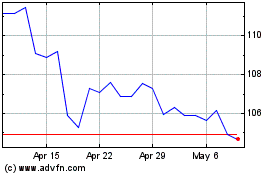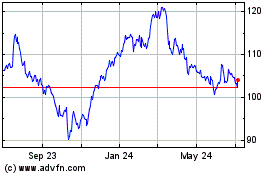St. Jude Medical Warns of Battery Problems With Heart Products -- 4th Update
October 11 2016 - 4:47PM
Dow Jones News
By Joseph Walker and Austen Hufford
St. Jude Medical Inc. warned Tuesday that a battery malfunction
could cause hundreds of thousands of its implanted heart
defibrillators to quickly lose power and stop functioning.
Two patients died after batteries in their St. Jude-made
defibrillators failed prematurely and prevented the devices from
providing needed shock therapy, the Food and Drug Administration
said in a separate safety advisory on Tuesday.
St. Jude, based in St. Paul, Minn., is in the process of being
acquired by Abbott Laboratories in a cash-and-stock deal initially
valued at $25 billion. The company does "not expect the medical
advisory to have a material financial impact" on its financial
results, a St. Jude spokeswoman said in a statement.
St. Jude shares were down 3.5% to $78.43 at 4 p.m., as Abbott
shares fell 5.4% to $41.16.
"We continue to expect the transaction to close by the end of
the year," Abbott spokesman Scott Stoffel said in an email.
St. Jude said the battery problem is a "rare occurrence" and
that it is "working with regulators and physicians to communicate
about this advisory and the resources we are providing to assist
with patient management."
The potential for premature battery depletion affects nearly
350,000 patients globally who have implanted cardioverter
defibrillators or cardiac resynchronization therapy defibrillators
manufactured by St. Jude before May 2015, the FDA said.
The devices alert patients that batteries are running low by
vibrating. When the devices are functioning normally, patients have
three months to replace them after receiving the alert, the agency
said. But the devices involved in the recall could stop working
within 24 hours to a few weeks of patients receiving the alert.
"If the battery runs out, the [devices] will be unable to
deliver lifesaving pacing or shocks, which could lead to patient
death," the FDA said in its safety communication. "The patients
most at risk are those with a high likelihood of requiring
lifesaving shocks and those who are pacemaker dependent."
However, the frequency of device failure is low and most
patients won't need to have their devices replaced early unless
they receive an alert, the agency said.
Patients with the devices are being told to monitor them closely
for battery failure and to contact their doctors if the device
notifies them of a battery problem.
The implanted devices provide pacing for slow heart rhythms and
electrical shock or pacing to stop dangerously fast heart
rhythms.
The malfunction occurs when deposits of lithium form within the
devices' batteries and create abnormal electrical connections,
leading to battery failure. The problem was identified by medical
researchers as far back as 2014, said Raj Denhoy, a Jefferies &
Co. analyst. St. Jude resolved the problem with a new battery
design in 2015, Mr. Denhoy said.
In addition to the two deaths, 10 patients have reported
fainting from devices that didn't provide pacing because of battery
depletion, and 37 patients have reported dizziness, the FDA said.
So far, 841 devices have been returned to St. Jude for analysis due
to premature battery depletion.
In recent months, St. Jude has been fending off allegations that
its devices are vulnerable to hacking and other cybersecurity
threats. St. Jude has denied the allegations and sued the short
seller who released the report accusing its devices of having
security holes.
Write to Joseph Walker at joseph.walker@wsj.com and Austen
Hufford at austen.hufford@wsj.com
(END) Dow Jones Newswires
October 11, 2016 16:32 ET (20:32 GMT)
Copyright (c) 2016 Dow Jones & Company, Inc.
Abbott Laboratories (NYSE:ABT)
Historical Stock Chart
From Aug 2024 to Sep 2024

Abbott Laboratories (NYSE:ABT)
Historical Stock Chart
From Sep 2023 to Sep 2024
